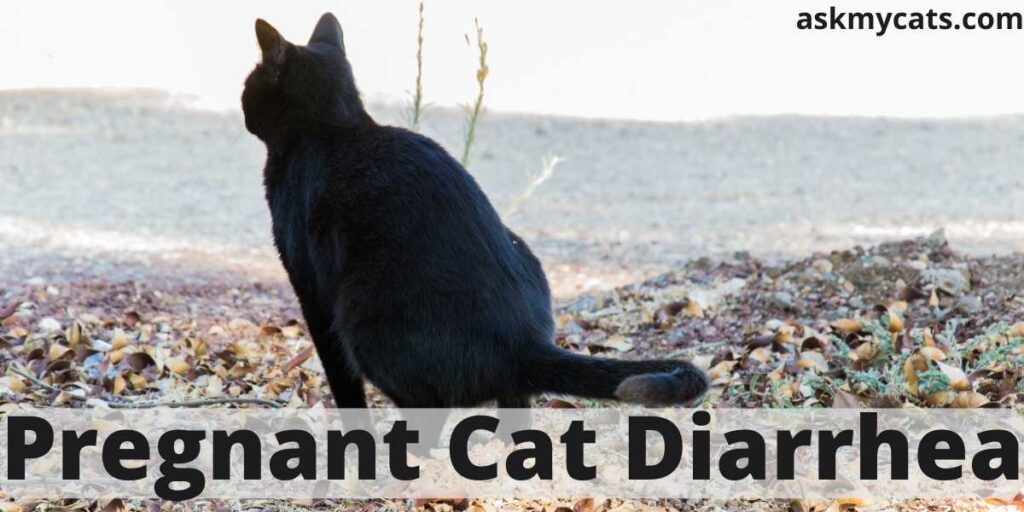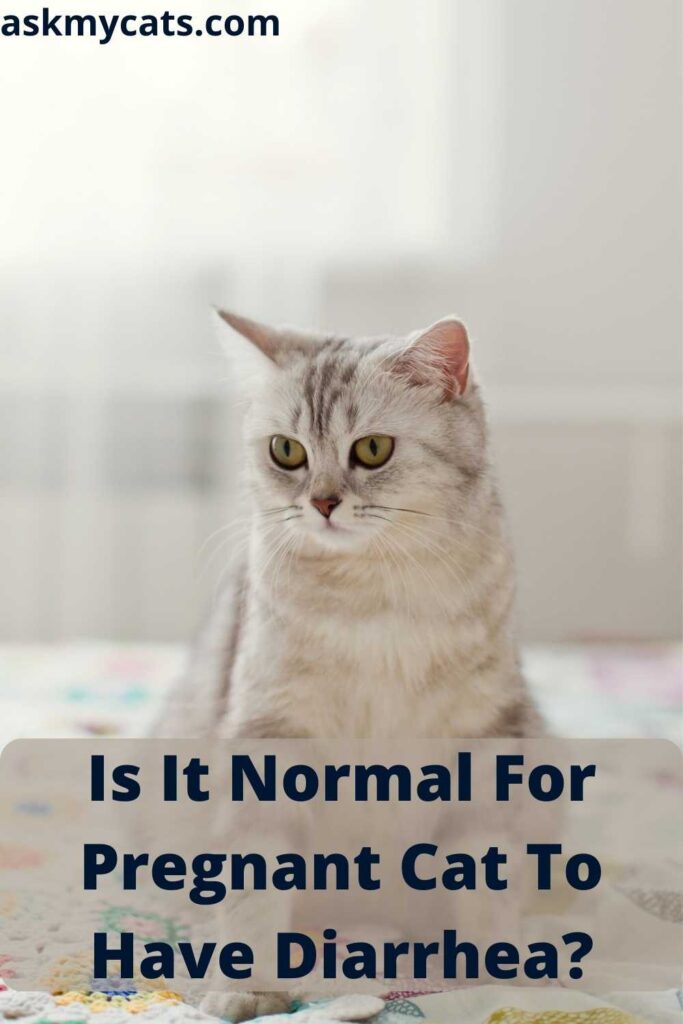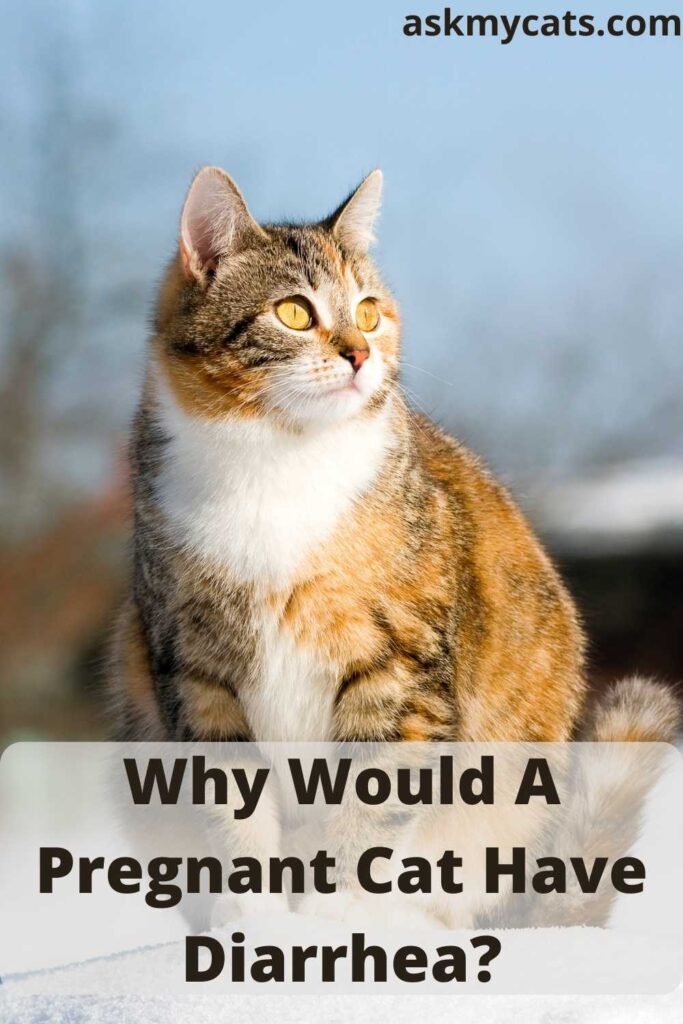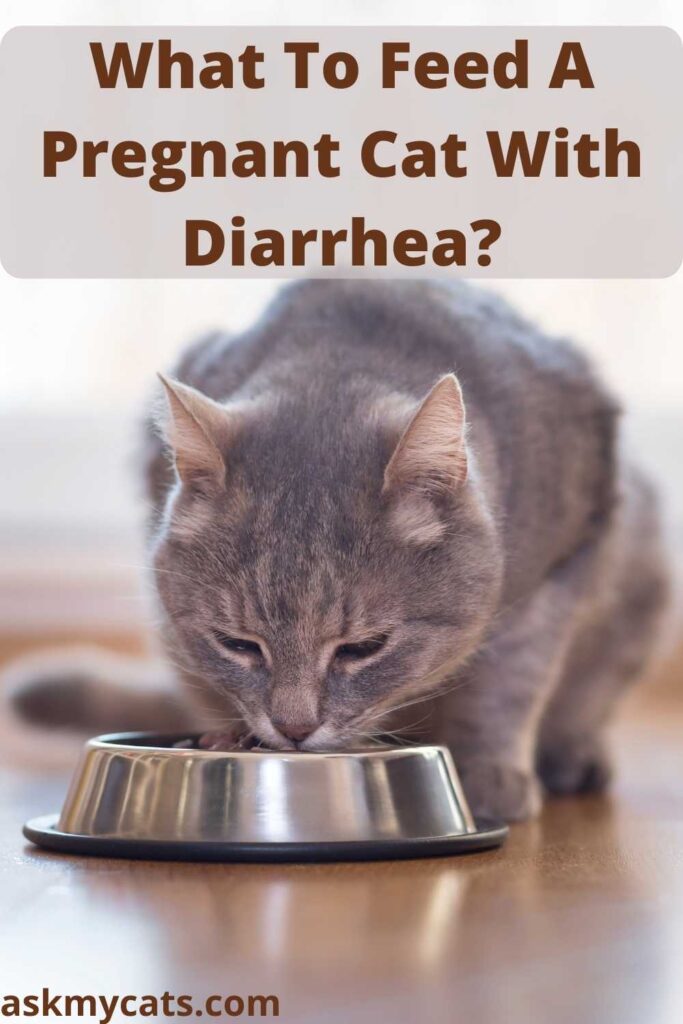Our feline friends hide disease and injury extremely well, so cat parents should be on the lookout for subtle signs of illness.
You must monitor your cat’s circadian rhythms, energy levels, eating and drinking preferences, and urination and defecation habits as a cat parent.
When it comes to defecation, consistency, color, and frequency are all important factors to consider—even if it feels awkward to bring up, your veterinarian wants to hear about your pet’s poop!
So, can a pregnant cat get diarrhea?
Yes, a pregnant cat could get diarrhea to both physical and behavioral changes.
Keep reading this article to know more about why a pregnant cat could get diarrhea and how can you cure them.


Give Your Cat the Perfect Day
Get the Free Ebook!
Is It Normal For Pregnant Cat To Have Diarrhea?
Yes, it is normal for a pregnant cat to have diarrhea.

Cats frequently experience diarrhea. It can happen for a variety of reasons, including pregnancy.
You need to be extra cautious if your cat is pregnant.
If she has diarrhea, you should be concerned.
The simple answer is yes. Diarrhea can occur in pregnant cats.
Cats frequently experience diarrhea. It can happen for a variety of reasons, including pregnancy.
You need to be extra cautious if your cat is pregnant.
If she has diarrhea, you should be concerned. The simple answer is yes. Diarrhea can occur in pregnant cats.
Diarrhea can cause loose or watery stools, as well as frequent stools. Diarrhea occurs when poop moves too quickly through the intestines. This can result in more frequent pooping.
The intestines are designed to extract water from poop as it passes through them. This allows the body to extract all of the nutrients before they are excreted as waste.
When it moves too quickly through the digestive system, all of the water is not removed. The excess moisture results in loose or watery stools.
The pregnancy itself can be stressful on your cat’s body, causing diarrhea. If stress is the only cause, it should go away in a day or two.
If it does not improve or resolve, she may be suffering from intestinal parasites. To add fiber and encourage hard stool formation, add 1-2 teaspoons of canned pumpkin (not the filling) to her food on a daily basis.
If things don’t improve, contact your veterinarian to see if they would like to see her (depending on how far along she is) for diarrhea treatment.
Some dewormers and medications are safe to use in pregnant cats, while others are not.
Why Would A Pregnant Cat Have Diarrhea?
Here are some reasons behind a pregnant cat having diarrhea: –

1. Preparing For Labor
If your cat is nearing her due date, she may experience diarrhea as her body prepares for labor.
This can happen for a variety of reasons.
When labor approaches, the body produces prostaglandins. This can result in loose stools.
Labor contractions can also cause diarrhea. The intestines are in close proximity to the uterus.
As a result, contractions in the uterus can also cause spasms in the intestines.
This causes the poop to pass more quickly, resulting in diarrhea.
2. Babies On Bowels
The body of your cat is limited in size. Things will become more crowded as the kittens grow.
If the kittens put pressure on the bowels, they may move more frequently, resulting in diarrhea.
When things are too tight, it’s a natural function of the body to make more room, and getting rid of waste is a great way to do so.
3. Hormones
Pregnancy is an emotional and hormonal roller coaster. Hormonal changes can cause diarrhea in cats just as they can cause morning sickness in humans.
Mother cats go through a lot of physical and mental changes during their pregnancy and birthing stages, so diarrhea is normal if it does not last more than two days.
Some diarrhea is completely acceptable since she changed her diet and is now consuming any feces and urine when stimulating the kittens.
Add some boiled white rice to her canned diet or give her 2 teaspoons of canned pumpkin per day to help firm up her stool.
4. Parasites
Diarrhea can be caused by intestinal parasites. This has nothing to do with pregnancy, but her system may be more sensitive during this time.
You can look for white spots or small worms in her poop. Lethargy and weight loss are also possible symptoms of parasites. To be certain, your veterinarian will need to test a stool sample.
5. Virus
Diarrhea can be caused by a stomach virus. It is possible that vomiting will occur. While experiencing symptoms, your cat may lose its appetite.
This could be the cause of her vomiting or general ill health. It is expected to be resolved within 48-72 hours.
Interesting Read: Why Is My Pregnant Cat Not Eating?
6. Anxiety
Diarrhea can also be caused by anxiety. Humans frequently describe themselves as having a “nervous stomach.”
When they are nervous or anxious, they may experience cramping and diarrhea.
Cats can experience the same phenomenon. During pregnancy, your cat goes through a lot of changes and may become more anxious.
Excessive meowing, a constant need for attention, not using the litterbox, aggression, and changes in activity level are also signs of anxiety.
If you notice these symptoms, your cat’s diarrhea could be caused by anxiety.
7. Change In Diet
A sudden change in diet or the addition of new food (or hunting/scavenging outside for food) is a common cause of mild and temporary diarrhea.
This frequently disappears as the intestine adjusts to the new food.
Mother cats, especially those who venture outside, may experience diarrhea if they consume bad (decayed) meat.
Many cats are lactose (sugar) intolerant, so diarrhea won’t go away unless the diet is adjusted in these cases where certain cats are unable to stomach specific foods.
During pregnancy, most veterinarians recommend feeding your cat kitten formula. This will provide her with the extra calories and nutrients she requires at this time.
A change in diet, on the other hand, can cause diarrhea. To avoid this, gradually introduce new foods into their diet.
Begin with 1/4 new food and 3/4 of what they are used to. Gradually increase the amount of new food and decrease the amount of old food until they are only eating the new food. This procedure should take about a week to complete.
Interesting Read: Do Cats Throw Up When Pregnant?
What To Feed A Pregnant Cat With Diarrhea?
Here are some things you can feed a pregnant cat with diarrhea: –

1. Fiber
Some types of cat diarrhea can be helped by a low-fiber (easy-to-digest) diet.
If your pregnant cat doesn’t get diarrhea very often but has a lot of feces when he does, a low-fiber diet may be worth a try.
Look for feeds that claim to be highly digestible or that are appropriate for cats with “sensitive stomachs.”
These items should have a crude fiber level of around 3% based on their guaranteed analyses.
To make matters even more complicated, some types of cat diarrhea respond to fiber supplements, most notably disorders that cause cats to “go” frequently but only produce a small amount of excrement at a time.
Unflavored psyllium (e.g., Metamucil) and canned pumpkin are two readily available fiber supplements.
There are no hard and fast rules for how to dose psyllium or pumpkin in cats, but 1-2 teaspoons sprinkled throughout the day in your pregnant cat’s diet is a good place to start.
2. Change Your Cat’s Diet
There is no reason to limit food for diarrheal pregnant cats. In fact, doing so can impair the digestive tract’s ability to heal itself, putting pregnant cats at risk of hepatic lipidosis, a potentially fatal type of liver disease.
It is, however, advised to keep your pregnant cat’s diet as simple as possible.
Remove any treats or table scraps and focus solely on the basic, nutritionally balanced cat food that you provide on a daily basis.
Return to the previous diet if you recently changed your pregnant cat’s food and see if your cat’s diarrhea resolves.
One or more of the ingredients in the new food may irritate your pregnant cat.
Even if you’re feeding the same brand and type of food as before but have just opened a new batch, it might be worth it to buy a new bag or case with a different lot number to eliminate the possibility of contamination.
More chronic adverse food reactions can occur at any time—a pregnant cat may have been eating the same food for years or may have recently switched.
Many cats who suffer from food intolerances or allergies will find that eating a hypoallergenic or low-antigen diet alleviates their symptoms.
Only veterinarians can provide the best low-antigen meals, but some pregnant cats benefit from over-the-counter products.
Look for diets that incorporate novel protein sources (e.g., duck or rabbit).
3. Encourage Water And Electrolyte Intake
To avoid dehydration, pregnant cats suffering from diarrhea should drink plenty of water.
Maintain fresh, clean water in your pregnant cat’s water dishes, and experiment with adding an extra bowl of diluted chicken or beef broth.
Another simple way to increase your pregnant cat’s water intake is to switch from kibble to canned food.
You can also temporarily supplement your cat’s canned food with an extra tablespoon or two of warm water.
4. Anti-Diarrheal Medications
Most anti-diarrheal medications should not be given to pregnant cats unless under the supervision of a veterinarian.
Some are downright dangerous, but kaolin-pectin treatments can be safely administered to pregnant cats.
The typical dosing regimen is 1 teaspoon for every 5 pounds of body weight every four to six hours.
Be aware that several kaolin-pectin-containing products (e.g., Kaopectate) are now manufactured in the United States with additional components.
5. Probiotic
Healthy bacterial populations in a pregnant cat’s digestive tract are required for normal digestion.
When they are disrupted, a cat’s diarrhea may continue even after the primary shock (stress, illness, antibiotic therapy, etc.) has subsided.
Probiotic pills can help restore the bacterial population of a pregnant cat’s gut. Choose a probiotic that has been labeled for use in cats and is made by a reputable company.
Frequently Asked Questions
Is diarrhea a sign of pregnancy in cats?
Diarrhea can be an indication of pregnancy. However, diarrhea can occur for a variety of reasons other than pregnancy. Many cats do not have diarrhea during their pregnancy. So, while diarrhea can be a sign of a pregnant cat, it is not a reliable indicator. If you suspect your cat is pregnant, look for other signs.
Is it normal for cats to have runny poop?
Cats frequently have runny poop. This, however, does not imply that it is normal. It’s critical to understand what healthy poop and diarrhea look like so you can spot potential issues with your favorite feline. It’s probably the last thing on your mind, but your cat’s poop can reveal a lot about their health. Cat poop is typically dark brown and firm. It should not be firm, but rather solid. It may have an odor, but it should not be overpowering or unpleasant.
How do you identify diarrhea in nursing cats?
Your veterinarian will diagnose your cat’s diarrhea by taking a thorough medical history, performing a physical examination, and, in some cases, collecting samples for laboratory testing. Document when diarrhea began, how frequent it is, and what it looks like, as well as any dietary or environmental changes made to your cat.
Final Words
Expect questions when you take your pregnant cat to the vet for diarrhea. It is best to document everything you can about your cat’s diarrhea so that you can inform the vet.
The length of time it has been happening, the frequency of the poops, and the consistency and color of the poops are all common questions. They will almost always request a stool sample as well. It is possible that you will be asked to bring in a stool sample for testing.
If you have any questions, ask us in the comments sections.
Must Read: Is It Normal For Cats To Have Diarrhea After Giving Birth?
